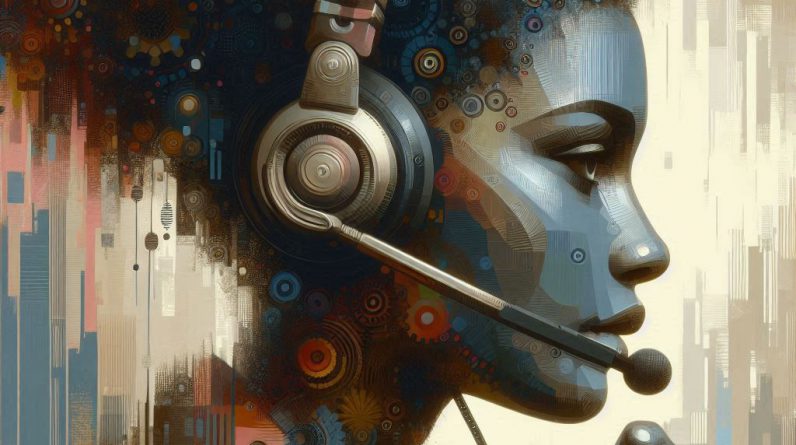Fears of a future where artificial intelligence overpowers flesh-and-blood humans have always been a paramount tenet of sci-fi storytelling. And when these sentient robots closely resemble human behavior and exterior appearance (as in “Blade Runner” or “A.I. Artificial Intelligence”), then the conundrum of whether they should be granted human dignity rather than being seen as disposable presents itself. But the closer that such a hypothetical reality feels to our present — with generative A.I. threatening artistic creation, for example — the less likely it seems we will ever feel compassion for these entities.
French director Jérémie Périn’s cyberpunk mystery “Mars Express” manages to further complicate our sentiments with its dense yet satisfying world-building. A gripping, heady and refreshing 2D animated take on the perils of man and machine coexisting, Périn’s first feature as a director inserts the necessary exposition in a mostly natural manner so we incrementally become aware of how this reality functions.
That the heroine here, Aline (Morla Gorrondona), is a pragmatic female police officer investigating the murder of an alleged hacker instantly invokes obvious comparisons with Mamoru Oshii’s seminal “Ghost in the Shell.” Then there’s the character design, which reads somewhere between anime and a comic book, even if deliberately more realistic here. As some important concepts about the mechanics of this alternate future are introduced, however, the similarities begin to seem minor.
In the hierarchy of creatures that inhabit Mars in the 23rd century, humans remain atop, but there are people who believe androids deserve freedom too, so they hack into the system and jailbreak them so that they no longer have to obey human commands. Some of these beings exist in metallic, evidently synthetic bodies, while others wear skin-like disguises to pass as flesh-and-blood mortals, but when hurt they bleed a blue substance that instantly distinguishes them from people.
As the issue of robots on the lo0se increases, a new threat appears. Someone has devised a code that, if updated into every machine, would not only free them but convince them that they must leave Mars to float in space no matter the casualties involved. Even this “freedom” is only an illusion programmed by their creators — which is Périn’s way of commenting on the limits of what we think of as a free will. What if what we know to be our ultimate goal is nothing more than an implanted fabrication?
Alin’s partner Carlos Rivera (Josh Keaton) has the body of a robot, but his head is a hologram of a man. The memories and personality of a real person were downloaded into this robotic body after their death so they can continue to exist. Carlos, and others like him, often acknowledge the fact that they have died. Their regrets follow them into this iteration of artificial existence. Other gadgets fit more standardly with those often seen in this genre, such as a small button-like device humans wear that allows for communication with others in through neurotransmission rather than speech.
Among the boldest narrative choices in “Mars Express” is that even in this distant future, on another planet, the human condition prevails at its most frustrating. Aboard the Mars Express spaceship that transports humans (and androids) from Earth to the Red Planet, Aline still must wait in line to use the lavatory, just like in a commercial aircraft in our current era. And she struggles with alcoholism, though liquor bottles in bars and hotel-room mini fridges lock themselves when in the presence of someone registered as sober — another mechanism that puts in question how much agency anyone has. These details about the irremediably quotidian nuisances and struggles elevate Périn and co-writer Laurent Sarfati’s screenplay with both humor and insight, suggesting that no matter how advanced technology becomes, there are inescapable desires and pains.
As the tally of deceased suspects and antagonists increases, Alin and Carlos learn that wealthy businessman Chris Royjacker (Kiff VandenHeuvel) has already developed an alternative meant to replace the robots. These new creatures are organic in nature, but still manmade. They are not animals, since some of them have impressive human-like cognitive capabilities (they’re essential floating brains) but would be easier to destroy in case of an uprise.
Périn continues to pile on the layers of ideas, while at the same time orchestrating striking fast-paced chases and shootouts. And because he occasionally allows the violence to follow its course to the worst possible outcome instead of giving in to more expectedly tamed beats, there are moments of genuine, nail-biting tension, so effectively has he us conditioned to know that death is a real possibility for the characters.
As “Mars Express” unspools, a handful of strong visuals references come to mind, such as French electronic duo Daft Punk’s animated long-form music video/animated feature “Interstella 5555: The 5tory of the 5ecret 5tar 5ystem,” a sci-fi project made in Japan. The realism in Périn’s digitally hand-drawn characters — notable in their fluid movement and facial expressions — contrasts with the sleeker, and more obviously computer-generated backgrounds. And from that slight dissonance between the two, some of the most memorable images result. As everything goes awry between humans and their manufactured companions, Alin runs through the city to find her final target under a sky that flickers as if some of its panels are turning off like dead pixels on an image. That’s because it’s actually a protective dome to provide humans with oxygen to stay alive.
Plot driven, “Mars Express” rarely halts its rapid pace to take a breather and ponder the philosophical implications of the dystopian picture it paints. But considering all that Périn successful conveys in less than 90 minutes, what we can glean about the characters’ yearnings from their interactions amid the thrilling action provides potent intellectual stimulation.






